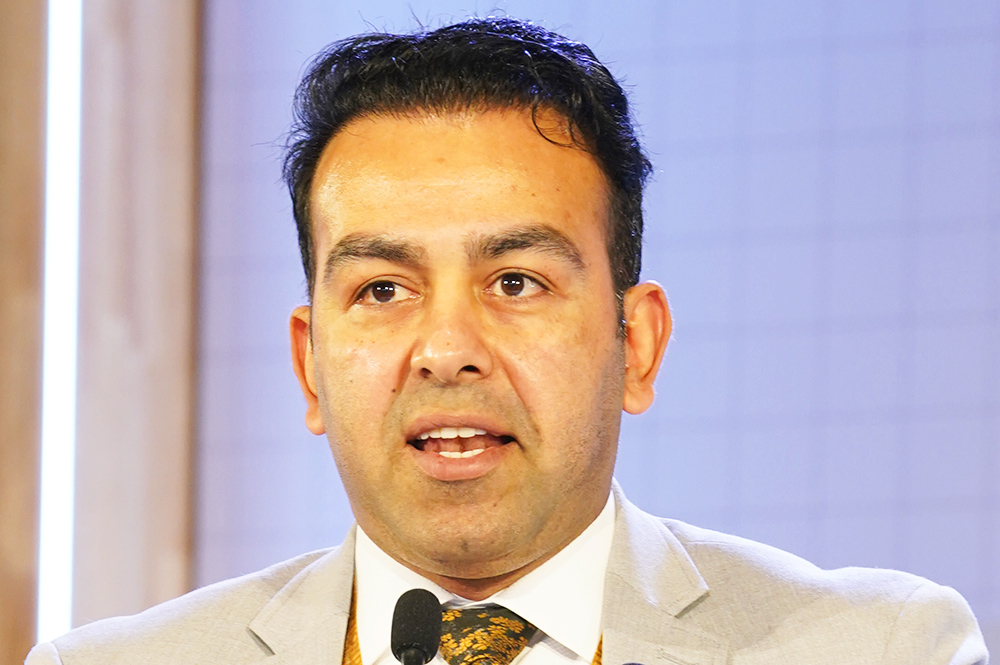In an exclusive ET Edge Insights interview, Safi Rauf, humanitarian, and founder of the Human First Coalition, delves into the profound motivations driving his work, pressing global humanitarian concerns, and the resilience forged through personal challenges. Rauf shares diverse experiences, from his role as a U.S. Navy reservist to navigating the complexities of humanitarian work and addressing accusations against his organisation.
Edited excerpts from the interview.
What was the motivation behind opting for this humanitarian work and doing it well considering the kind of risks involved?
I have always been interested in humanitarian work. My passion for helping others stems from my own experiences and is deeply rooted in my upbringing. Born a refugee to Afghan parents, I immigrated to the USA, encountering numerous challenges along the way. These experiences taught me valuable lessons. When I reached a point in my life where I could extend help, I felt compelled to do so. Having received assistance from others during my journey, I became the person who goes back to assist those facing similar challenges.
What do you think are some of the most pressing humanitarian issues globally?
The primary humanitarian issue we face today is displacement, a consequence of various factors such as war, natural disasters, and climate change. Currently, close to 100 million people are displaced, with the majority resulting from conflicts in their native countries. However, as climate change intensifies, this number is projected to escalate to a staggering billion people. Developed countries, including the USA, are not immune, facing challenges like wildfires in California. This impending global displacement crisis demands collective action on an unprecedented scale, both economically and socially.
You are a US navy reserve, so what prompted you to enlist as a navy reserve? Could you briefly explain the role?
In my capacity as a U.S. Navy reservist, I am poised to answer the call of duty whenever required. Notably, during the COVID-19 pandemic, I was deployed to New York City, where we swiftly established a makeshift hospital with 4000 beds in a warehouse, responding to the surge of patients.
The U.S. Navy, distinguished for its humanitarian efforts, has hospital ships, Mercy and Comfort, which embark on global missions to provide essential aid. During humanitarian mission days, our team, comprising medical professionals and administrators, delivers crucial medical assistance worldwide.
While my long-term aspiration is to become a surgeon, the immediate need for humanitarian aid currently takes precedence. The Navy’s commitment to global well-being aligns with my dedication to meaningful contributions in times of crisis. I remain hopeful that the opportunity to pursue a program in flight surgery will arise in the future, allowing me to further integrate my professional aspirations with the Navy’s distinguished tradition of humanitarian service.
Could you share the challenging experience of being kidnapped by the Taliban and how did it feel to finally return home and restart your life?
Finding oneself entangled in such a unique and unforeseen predicament is an experience for which one can never be adequately prepared. Despite hearing narratives from others, the unimaginable becomes a stark reality when one becomes a direct participant. This harrowing ordeal, taken hostage by the Taliban, proved to be an exceptionally challenging chapter in my life.
In the face of such adversity, the resilience and unwavering support exhibited by my family, friends, and loved ones became a beacon of hope. Their tireless efforts, working day and night for my release, underscored the strength of the bonds that tie us together.
Notably, President Biden, having been briefed on the situation in his weekly briefings, personally intervened to secure my release. The decisive action, including the dispatch of a plane for my retrieval, exemplified the highest levels of commitment to the well-being of an American citizen. The outpouring of support from countless well-wishers upon my return was both humbling and heartening. Witnessing the collective rooting and encouragement from those around me reinforced the significance of the relationships forged during such trying times.
In the aftermath of this ordeal, my transition back to everyday life has been remarkably smooth. Undeterred, I have immersed myself in my work without missing a beat. The resilience to continue my endeavours stems from the profound understanding that the work itself is of paramount importance. Despite the traumatic nature of the experience, the enduring gratitude for the unwavering support of my loved ones serves as a source of strength.
Looking ahead, I remain resolute in my commitment to ongoing efforts, knowing that, if faced with similar challenges in the future, I can confidently rely on the steadfast support of my loved ones. This journey, though marked by hardship, has affirmed the enduring power of human connections and the resilience that emerges from shared experiences.
What priorities have you set for the near future, and are there particular actions or initiatives you recommend people focus on immediately?
I am deeply committed to ongoing advocacy efforts, particularly for the people of Afghanistan and women in the region who have been significantly impacted by the restrictive policies imposed by the Taliban. The curtailment of fundamental rights, such as the prohibition on education and employment, has resulted in the confinement of women within their homes. It remains a top priority for me to persist in my endeavours to improve the situation and explore effective avenues for support.
Two years since the Taliban assumed control, there is an urgent need to formulate meaningful solutions to address the myriad challenges faced by women in Afghanistan. It is my hope that in the coming year, concerted efforts will yield tangible progress in ameliorating their conditions.
Additionally, a passion for environmental advocacy propels me to address the challenges posed by climate change, recognising the disproportionate impact on poorer and indigenous communities.
A few years ago, the Human First Coalition was accused of mistreating refugees. What are your thoughts on that?
It is imperative to clarify that a thorough investigation was conducted to ascertain the origins of the accusations levelled against our organisation. Subsequent findings revealed that these allegations were orchestrated by individuals harbouring personal grievances against both myself and the organisation. Their assertions were proven baseless, constituting false accusations born out of malice.
Engaging in humanitarian work, inherently challenging, demands a delicate balance as the scope of those in need invariably exceeds our capacity to assist everyone. Regrettably, the harsh reality is that, despite our concerted efforts, it is impossible to extend aid to every individual in need.
Complicating matters further, the humanitarian sector often intersects with individuals who, having endured significant trauma, may exhibit psychological challenges, including difficult personalities. In some instances, these challenges escalate into volatile and combative behaviour, resulting in unfortunate incidents within our shelters and refugee camps. Instances of assault on our staff by such individuals necessitate the implementation of stringent measures to ensure the safety and well-being of all involved.
It is noteworthy that we have diligently addressed such incidents, undertaking serious actions against those responsible. However, the fallout from such actions often manifests as personal vendettas, leading individuals to fabricate stories and accusations against the organization. Despite the gravity of these allegations, a meticulous examination found no substantiating evidence, allowing us to decisively refute the claims.
Fortuitously, we have successfully navigated through these challenges, not only vindicating our organization but also rectifying the underlying issues that contributed to the accusations. This resilience has enabled us to maintain our commitment to the humanitarian cause while dispelling unwarranted claims, thereby upholding the integrity of our mission.
What’s a typical day in the life of Safi Rauf?
The nature of our work is inherently unpredictable, devoid of the structured routine found in a conventional 9-to-5 job. Our days commence at varying hours, with some starting early while others extend into sleepless nights. The fluidity of our responsibilities means that, at times, everything aligns seamlessly, requiring minimal intervention for days on end.
Unlike the typical workday ritual of waking up, grabbing coffee, and heading to the office, our environment is characterized by constant flux. We operate in a dynamic field where circumstances develop rapidly, demanding adaptability and immediate responses. There is no fixed starting or ending point to our days. They may entail responding to crises such as individuals being taken by the Taliban, medical emergencies, or addressing basic needs like food and water. Moreover, our support extends to handling more nuanced situations, including assisting those undergoing traumatic breakdowns.
Our commitment lies not only to our immediate staff but also to individuals overseas who rely on our aid. Describing a typical day becomes challenging due to this inherent variability, where each day unfolds differently, shaped by the diverse and evolving demands of our humanitarian mission.
Is there a specific message you would like to convey to our audience through this interview?
Over the past four to five decades, we have been fortunate to encounter challenges that could be mitigated through the intervention of one or two developed nations offering assistance. A poignant example of such collaboration emerged during the 1970s and 1980s when a severe food shortage threatened lives on a global scale. Faced with the imminent spectre of widespread starvation, a collective effort by developed nations gave rise to strategic plans and the development of new strains of wheat and maize. A figure I greatly admire pioneered a new grain strain, planting it in Mexico and various locations. This initiative resulted in a plentiful food yield, successfully addressing the challenge at hand.
However, the challenges we face today require a collective effort unprecedented in scale. Unlike the challenges of the past, the current disruptions demand a global collaboration to address issues such as wars, imminent threats, and environmental crises. People worldwide must unite and work towards a peaceful and collective future for humanity.



